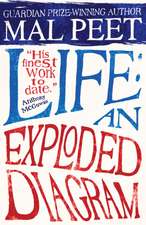Love Is Not Enough: What It Takes to Make It Work
Autor Henry Kellerman Ph.D.en Limba Engleză Hardback – 9 aug 2009 – vârsta până la 17 ani
Preț: 362.96 lei
Preț vechi: 478.37 lei
-24% Nou
Puncte Express: 544
Preț estimativ în valută:
69.45€ • 72.71$ • 57.47£
69.45€ • 72.71$ • 57.47£
Carte tipărită la comandă
Livrare economică 05-19 aprilie
Preluare comenzi: 021 569.72.76
Specificații
ISBN-13: 9780313379963
ISBN-10: 0313379963
Pagini: 160
Dimensiuni: 156 x 235 x 18 mm
Greutate: 0.4 kg
Editura: Bloomsbury Publishing
Colecția Praeger
Locul publicării:New York, United States
ISBN-10: 0313379963
Pagini: 160
Dimensiuni: 156 x 235 x 18 mm
Greutate: 0.4 kg
Editura: Bloomsbury Publishing
Colecția Praeger
Locul publicării:New York, United States
Caracteristici
Includes case studies of individuals and couples demonstrating different types of compatible and incompatible relationships
Notă biografică
Henry Kellerman, PhD, is a psychologist/psychoanalyst in private practice in New York, NY.
Cuprins
IntroductionPart One: Your RelationshipPREVIEW1 Getting Close in the RelationshipWhat Is the Goal of a Good Relationship?Is It Possible That Everyone Marries for the Wrong Reason?Values versus PersonalitySuffering and PersonalityTalkingListening versus Disregard2 The Relationship in Its ContextCulture of the MarriageRepairChange in RelationshipsThe Important People Are HereRules of Approach and RejectionPartners Take Each Other Very SeriouslyYou Behave toward Your Spouse as You Did toward Your Same-Gender Parent3 How to Save the RelationshipThe Good ParentEvent versus ProcessThe Algebra of RelationshipsReminder: Be a First among EqualsTo Lose, Not to Win4 Differences between Men and WomenRolesCommunication: Yes versus NoCommunication: Yes and No, AgainCommunication: The Difficult Theme for MenCommunication: The Difficult Theme for WomenMen and Women: Other Differences5 The Reality of MarriageThree Fires10-Point Scale for MarriageThe Perfect Is the Enemy of the GoodPersonal Life and Professional LifeDon't Make It Two against OneTwo Equals Zero6 Dangers and Opportunities in the RelationshipThe Romance of LifeThat Which Initially Attracts You Is That Which Eventually Kills YouPsychological Immune SystemCrisis and SexPart Two: YouPREVIEW7 Your Main Task in LifeWishes and AngerWhat Is the Main Task of Life?Symptoms and ConsciousnessAggravation versus Trouble8 Rising above Your ResistanceCountRetain Your IndividualityThe LineTimeGutsProcrastinationThe World Is a C-9 How and Why People Get Together (or Don't)Mate Selection CriteriaRescue MissionsLet Everyone Have His or Her Own ProblemsMen Marry Their Fathers; Women Marry Their MothersTo Get Together or Not10 Managing the CrisisPosttraumatic StressWith Whom Do You Identify?EmotionsThe Minds of Specific EmotionsWhiningDefensivenessAnswering Questions or Not Answering QuestionsMagical ThinkingPart Three: Personality StylesPREVIEW11 Emotionally Controlled TypesThe Absence-of-Warmth TypeThe Orderly TypeThe Critical Type12 Emotionally Expansive TypesThe Falling-in-Love-Easily TypeThe Self-Love TypeThe High-as-a-Kite Type13 Emotionally Antagonistic TypesVarieties of the Angry TypeThe Manipulator TypeThe Mean/Cruel Type14 Emotionally Vulnerable TypesThe Clinging TypeThe Can't-Do-Anything TypeThe Down-in-the-Dumps TypeThe Victim TypeThe Worried Type15 Emotionally Volatile TypeThe Loaded-with-Problems Type16 Emotionally Healthy TypeThis Is the One!The BeginningAbout the AuthorBooks by the Author
Recenzii
With minimal jargon, a psychologist/psychoanalyst in private practice in New York City gives practical advice on intimate relationships. With case examples, he explains what each individual's personality contributes to the drama and which emotional styles (of 20 described) promote or hinder compatibility. Self-assessments help readers identify what they are doing to help or hurt a relationship.






